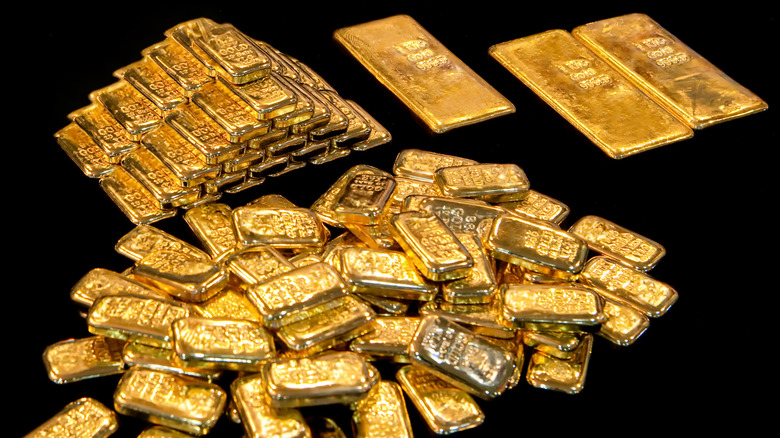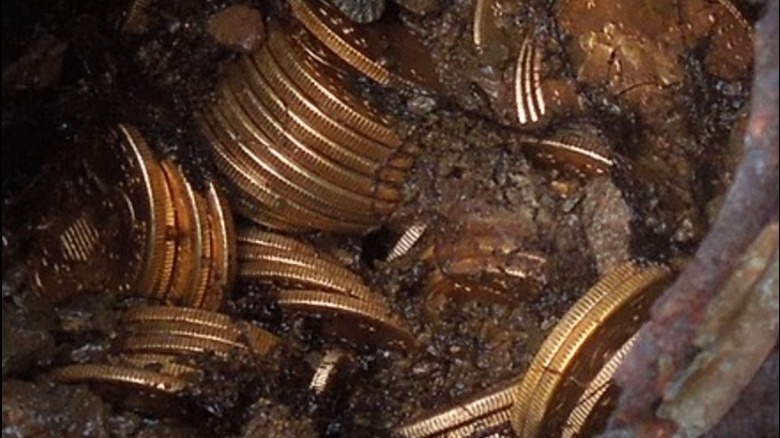Can You Keep Buried Treasure If You Find It?
Buried treasure is the stuff of adventure stories and fantasy, yet it's also a real thing that a fortunate few find in their lives, inspiring the hope that discovering a buried treasure is a real possibility. Most of us won't stumble upon $10 million worth of gold coins while walking our dog like a California couple did in 2014, but if you want to go looking for it, there are still quite a few rumored buried treasures waiting to be found all around the world and in the U.S.
However, finding One-Eyed-Willy's treasure doesn't automatically mean the town will be saved from developers. If you haven't seen "The Goonies," the point is, finding a buried treasure doesn't automatically make you wealthy. In a lot of cases, it can be a "finders keepers" situation, but the rules around who keeps a found treasure vary by state because there is no federal law that governs how it's handled. One thing the feds make sure of, though, is that if a "treasure trove" is found on federal land and is more than 100 years old, it's the property of the U.S. government. That distinction comes under the Archaeological Resources Protection Act of 1979.
What constitutes treasure?
A "treasure trove" is typically defined as gold, silver, or cash that's discovered and has no discernible owner. The Numismatic Bibliomania Society (NBS) breaks down how things are viewed regarding found items, which are labeled as "mislaid, lost, abandoned, or 'treasure trove.'" Mislaid means someone dropped an item and didn't realize it, and lost refers to accidentally leaving something somewhere. In both of those cases, if no one goes back looking for the item, the item is considered abandoned. A treasure trove, though, refers to something of high value with an unknown original owner. Those distinctions shape whether or not a finder of an item gets to lay claim to it.
In the case of buried treasure, odds are, the people who put it there are no longer living, so let's go with that scenario. In most states, if you and your trusty metal detector find a bunch of gold doubloons in Wisconsin, Arkansas, Oregon, Connecticut, Ohio, Delaware, New York, Georgia, Iowa, Indiana, Maryland, or Maine, the treasure is yours to keep under the Treasure Trove Rule.
Many other states say if treasure is found — and this includes anywhere, not just buried but also in attics, mattresses, or hidden in objects — it's the finder's duty to try to locate the owners. In those cases, law enforcement may get involved, and there is typically a length of time the true owners have to come forward. In some cases, if you don't report it and are found out, it's considered theft. If no one has a credible claim, it's yours. Two states call property owners' rights, though. Idaho and Tennessee's laws say any treasure found belongs to the property owner and not the person who finds it. The reasoning is to deter trespassers from slinking around on private grounds.
A real-life scenario
For a real-life scenario, we can look to the California couple who found $10 million worth of gold coins while walking their dog. They were on their own property when a small, rusty can sticking out of the ground caught their eye. They dug it out to find a stack of dirty gold coins inside dating from the mid- to late 1800s. They kept digging and found several more decaying canisters holding a total of 1,400 gold coins, including the rare $20 coin minted during the gold rush. While the coins were covered in dirt, they turned out to be in nearly mint condition.
In California, the law around treasure troves says you have to notify police of anything $100 or more. For a while, their stake in the claim was in question. ABC News reported that a coin collector/historian believed that some of the markings pointed to the coins being stolen from the U.S. Mint in a known heist, which explained why they still looked so new. Most of them had never been put into circulation. If that were the case, then the true "owner" would be the U.S. government. However, a spokesman from the U.S. Mint said they couldn't confirm that the coins were stolen.
The finders of what's known as the Saddle Ridge Hoard got to keep the treasure because they checked all the boxes. The loot was found on their property, they followed the state laws, and no one else could claim it. Pretty sweet. If you ever happen to find your own buried treasure, the best thing to do is check your state laws and go from there. Happy hunting!


